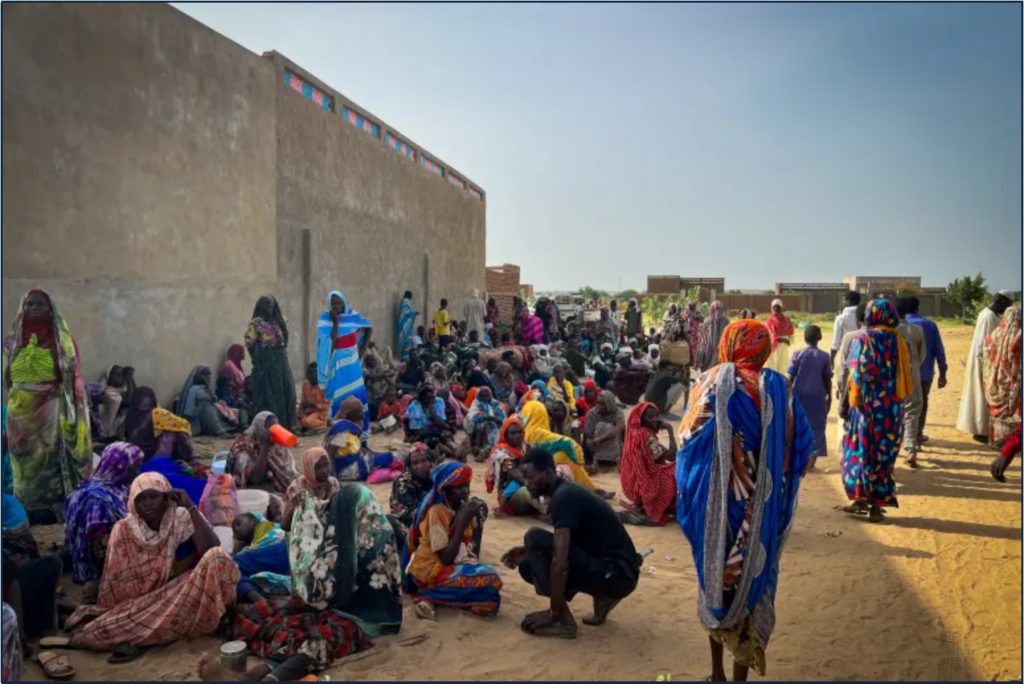Sudanese refugees gather as Doctors Without Borders (MSF) teams assist the war wounded from West Darfur, Sudan, in Adre hospital, Chad on June 16, 2023 [Mohammad Ghannam/MSF via Reuters]
For a brief moment, the eyes of the world were on Sudan as civil war swept the nation last April, following the collapse of the fragile power-sharing agreement between the Sudanese Armed Forces and the Rapid Support Forces. Since then, the brutal conflict has vanished from the international agenda as swiftly as it has laid waste to the country.
On April 15, exactly one year after the calm was shattered, a high-level conference on Sudan will be held in Paris. Hosted by France, Germany and the European Union, it offers a vital opportunity to refocus international attention on this forgotten crisis. Global leaders must seize it.
The violence has killed thousands, uprooted millions, and unleashed a humanitarian disaster that threatens to export instability throughout this region of Africa. The implosion of Sudan adds to the insurgencies gripping the neighbouring Sahel countries, potentially scarring the continent with a zone of instability stretching from the Atlantic to the Red Sea.
Harrowing attacks against civilians are the alarming hallmark of this conflict. These include indiscriminate and ethnically motivated killings in Darfur and widespread sexual violence against women and girls. Hunger is also rampant. Together, these factors have sparked the world’s fastest-growing displacement crisis, and the largest displacement of children, at a speed and scale that is astounding.
In less than a year, 8.5 million people have been forced from their homes, and more and more people are on the move as conditions worsen. Nearly two million have fled over the borders, most of them into Chad, South Sudan and Egypt, to escape the bloodshed. More than half of those seeking sanctuary are children. Neighbouring countries have extended a hand to people in desperate need but some are already buckling under the weight of their humanitarian emergencies.
There is also a serious risk the region could soon become the world’s largest hunger crisis. In Sudan, where food prices had spiked by more than 110 percent by February, nearly 18 million people are acutely hungry, while nearly seven million in South Sudan and three million in Chad face the same fate – almost 28 million people in total.
Within Sudan, famine is now a real and dangerous possibility in the months ahead. There are significant numbers of people experiencing emergency levels of food insecurity – in effect, they are one step from famine – yet 90 percent of them are trapped in areas largely inaccessible to humanitarian agencies. These include conflict hotspots such as Khartoum, Gezira state, the Kordofan, and the Darfur states.
Sudan’s children are feeling the cruel impact of this war most of all. Six-year-old Fatima, for example, who was displaced twice, first when fleeing fighting in Khartoum with her family, and then from Gezira to Kassala, longs for home, school and peace.
She is one of the nearly five million children who have been displaced, and the 19 million who are receiving no education as schools have been shuttered, teachers’ salaries are unpaid and school running budgets are missing. The consequences of these wrecked futures will be felt for a generation.
The international community must act now to avert the looming regional calamity.
First, there must be a coordinated effort to secure unimpeded humanitarian access and ensure protection for civilians in Sudan. This includes local volunteer groups and women’s organisations supporting the survivors of sexual violence, who are themselves being targeted.
Despite the recent United Nations Security Council resolution calling for unrestricted humanitarian access, real progress has yet to be seen on the ground. Operations to deliver relief supplies to populations in need – across borders and battle lines – continue to face obstruction. All the while, humanitarian supplies and teams are subject to looting and attacks.
We need all parties to provide unfettered access, and all border crossings to be open, especially those into the Darfurs and Kordofans. Creating the space for aid agencies to operate effectively is now an urgent humanitarian imperative.
Second, the spiralling crisis demands a properly funded emergency response. Despite massive needs, the $2.7bn joint humanitarian appeal for Sudan, which aims to provide lifesaving support to nearly 15 million people, is just 6 percent funded.
Additional resources are equally vital to assist the refugees and returnees now in the surrounding countries. In South Sudan, a lack of funds means three million acutely hungry people are currently receiving no food aid. Meanwhile, in Chad, only an urgent cash injection will prevent all 1.2 million refugees in the country and nearly three million Chadians from losing their rations later this month.
These are all desperately vulnerable people in need of international support and protection whom our teams can access, but can no longer afford to assist. If these cuts are allowed to go ahead, the resulting spike in hunger will only cause further suffering to those who have already lost so much, and accelerate the region’s slide into instability and chaos.
The predictable result of continued underfunding in front-line asylum countries is that more people will feel compelled to move – including attempting dangerous crossings across the Mediterranean.
Finally, and fundamentally, this forgotten crisis requires sustainable political solutions to halt the fighting that is tearing Sudan apart and destabilising its neighbours.
The Paris conference is a critical opportunity to launch a fresh diplomatic initiative aimed at ending the violence, averting famine and restoring the wider region’s fragile equilibrium. We urge the international community not to let it go to waste.
About the Author
Filippo Grandi is the United Nations High Commissioner for Refugees.

Martin Griffiths, UN Under-Secretary-General for Humanitarian Affairs and Emergency Relief Coordinator

Cindy McCain, World Food Programme Executive Director

Catherine Russell, Executive Director of UNICEF

